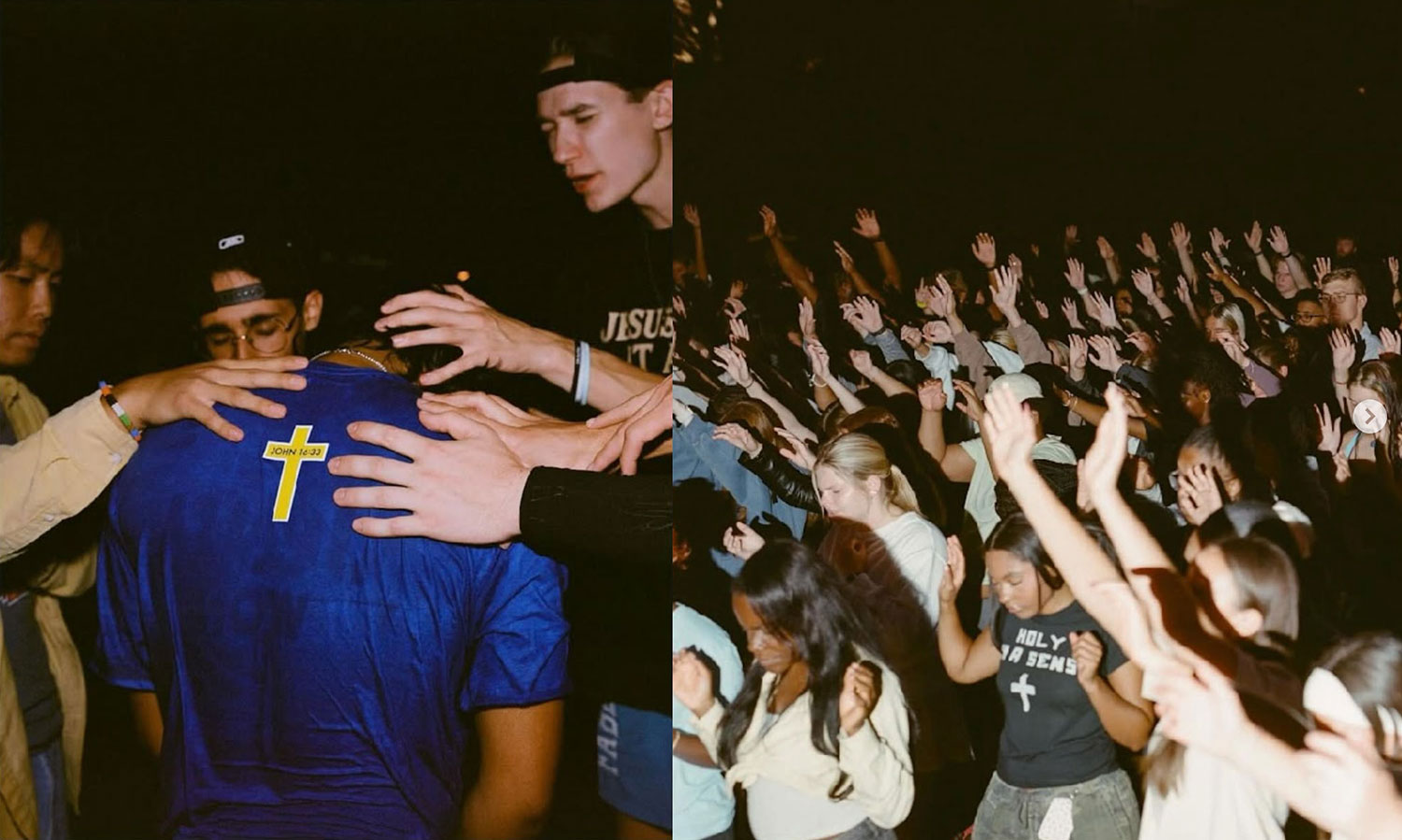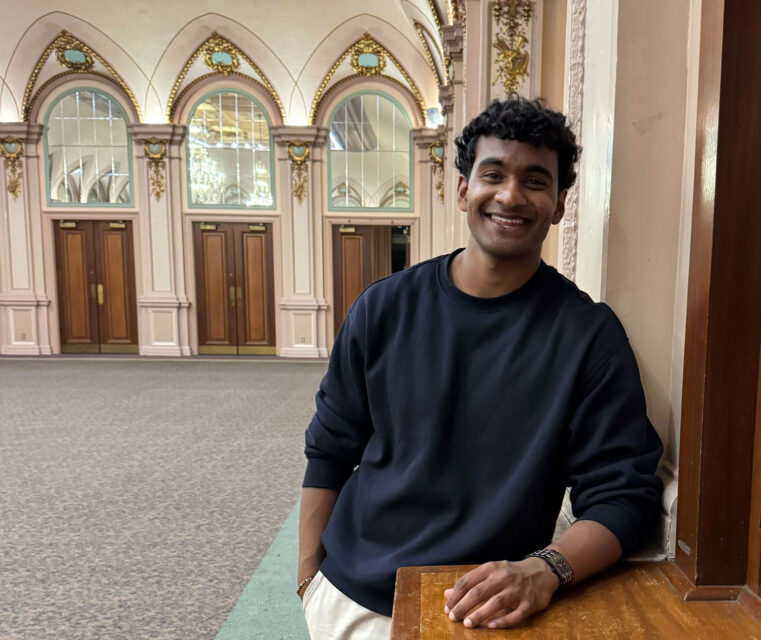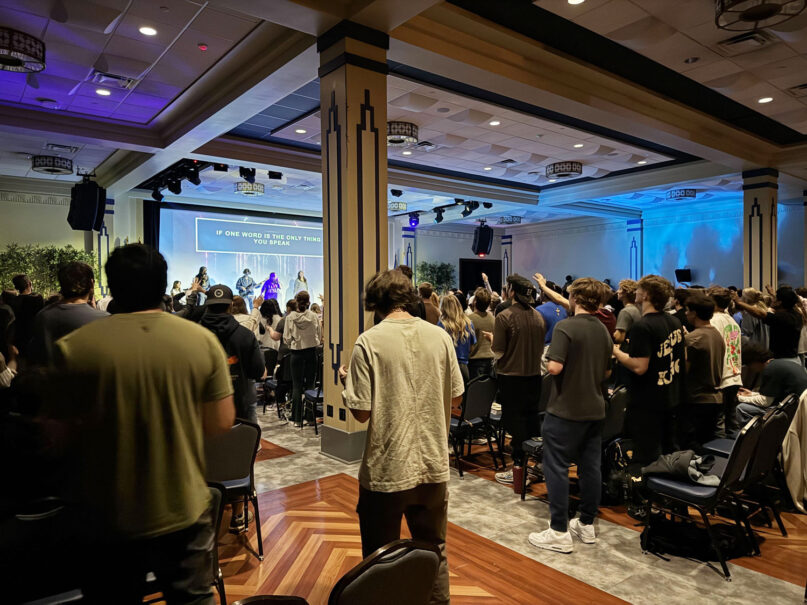
PITTSBURGH (RNS) — It’s 9 p.m. on Oct. 13, a Monday, on the University of Pittsburgh’s campus. There are two NFL games on TV and fall midterms are this week — but roughly 300 students are packed into a room in the student union building, clapping or raising their hands in worship.
“No treasure of this life could ever satisfy,” the students sing, some standing, others kneeling in the back. “God, you are my everything.”
Moments later, the group’s founder, 34-year-old Jordan Kolarik, grabs a mic and heads to the front of the room to deliver a message on devotion. He’s nearly buzzing with energy as he reads aloud a passage from Matthew 26 about a woman anointing Jesus with expensive perfume.
“You can believe the right things, you can say the right things, you can kind of go to church, but never have real devotion to Jesus,” he says.
In fall 2022, Kolarik, a Pittsburgh native and former high school teacher, launched this chapter of Chi Alpha with just eight volunteers. This year, the student chapter, which is affiliated with the charismatic, evangelical denomination Assemblies of God, has 77 student small group leaders leading hundreds of students.
“It’s sort of like a pyramid scheme for Jesus,” Kolarik joked.
Though the chapter’s growth is striking, students say it’s part of a broader stirring on campus. The Pittsburgh Oratory, a Catholic campus ministry serving several Pittsburgh universities, recently began hosting Sunday Mass in a larger chapel due to surging student attendance. In September, the University of Pittsburgh football team made national headlines for spearheading what some called a campuswide “revival”; roughly 65 students reportedly professed faith in Christ and 80 were baptized.
And the displays of devotion aren’t exclusive to Pittsburgh. The Ohio State football team has drawn national attention for baptizing dozens of students at public “Invitation to Jesus” events. The campus movement UniteUS, which brings large-scale evangelical worship and baptism events to colleges, reports that 13,000 college students have made “decisions to receive Christ” since 2023.
Now, in the wake of the assassination of conservative activist Charlie Kirk, claims of nationwide revival are escalating.
“Charlie started a political movement but unleashed a spiritual revival,” Defense Secretary Pete Hegseth declared at Kirk’s memorial service. Political commentators, TPUSA spokespeople and Christian worship leaders have also linked Kirk’s passing with revival, especially among young people.
But while Fox News has claimed that members of Generation Z are returning to church in astounding numbers, religious trends researcher Ryan Burge said assertions of revival are largely overblown: “We’re not seeing anything at the scale that would even begin to point me in the direction of a sustained, significant, substantive revival in America right now,” he told RNS. “It’s not a return to religion among Gen Z. It’s just they’re not leaving as fast as millennials did when they were in their late teens and early 20s.”
Recent data from the evangelical Christian polling firm Barna Group has been widely cited to support revival claims. While most data about religion and young people shows that Gen Zers are the least likely to attend services, Barna’s model found that among those already attending church, Gen Zers attend more regularly than other generations of churchgoers — 1.9 times per month, just slightly more frequently than millennial churchgoers (1.8 times). Barna CEO David Kinnaman also told RNS there’s “a higher percentage of Gen Zers today than five years ago who are saying they have made a commitment to Christ.”
Still, while Kinnaman said he’s personally praying for revival, as a researcher he’s using the language of “renewal” to describe what he’s seeing so far. And Barna has also reported counter trends, with Gen Z women being increasingly likely to identify as religiously unaffiliated.
Conflicting claims of revival could be due in part to different definitions of the term. Some use “revival” to describe a high-octane religious event; the Rev. Adam Miller, a pastor of Pittsburgh’s Life Church and mentor to several Pitt football players, said revival is, “at a base level,” a movement “from death to life” that also “goes beyond a moment.”
Burge said that from a research standpoint, it would require overwhelming evidence from multiple sources to demonstrate revival.
“If we talk about the First Great Awakening and the Second Great Awakening … the entire trajectory of religion in America changed in those moments,” said Burge. “My definition of revival is a whole lot more people going to a house of worship this weekend than a year ago. And by a whole lot, I don’t mean 100,000 nationwide or 500,000 nationwide. I mean 5 million, 10 million, 15 million. That’s what a revival is like.”
Still, on the ground, there seems to be a shift in how Gen Z is engaging with religion. Liz Bucar, a professor of religion at Northeastern University in Boston, said that from where she sits, it’s clear the syncretic, ad hoc, New Age approach to spirituality by some older generations “has not been satisfying to Zoomers.” In response to the instability of today’s world — global wars, climate change, COVID-19 — she’s seeing a desire for more structured community, and for moral frameworks that can help Zoomers navigate a suffering world. Some Gen Zers are seeking that outside the institutional church, she said, while others may be attracted to the unambiguous answers offered by more traditional faith communities.
Jake Overman, a 6-foot-4-inch senior tight end on the University of Pittsburgh football team, told RNS the gospel of Jesus has been a source of purpose and fulfillment among his teammates. Overman grew up in a nondenominational Christian church and said that while praying in his room earlier this year, he clearly heard God tell him, “It’s time.”
In response, he started a Bible study with his teammates. Called “The Pitt Men of God,” the group meets weekly, typically in the football facilities after practice. “It was so clear that there was a hunger on this team for God,” said Overman, who also launched the Pitt for Jesus campus event that made national headlines last month. “They’ve tried girls, they’ve tried drugs, they’ve tried alcohol, they’ve tried parties, they’ve tried going to see therapists. … They’ve tried all of these things, yet they still were coming up empty.”

Joshua Raj is a 20-year-old junior and Chi Alpha small group leader at the University of Pittsburgh. (RNS photo/Kathryn Post)
Joshua Raj, a 20-year-old junior and Chi Alpha small group leader at the University of Pittsburgh, said he thinks faith has appealed to many of his Gen Z peers amid the “chaos” of global events. “There has to be something more,” he said.
Raj was among several Chi Alpha students RNS spoke with who said they’d developed a transformational relationship with God, saying they felt deeply known and loved. They also said that transformation has had outward manifestations, too. Chi Alpha small group leaders pledge to refrain from alcohol, and, according to senior small group leader Katie McLean, the group sends out evangelism teams on Friday nights and hosts tailgates and Halloween parties free from alcohol.
Though Pitt’s Chi Alpha chapter has been home to a handful of new Christian converts, most participants were once “culturally Christian,” according to group founder Kolarik. The group is known for its high-energy events (glow-in-the-dark parties, flag football tournaments) and for its intentional discipleship of student leaders. “We are excellent at reaching kids from a Christian home, but they themselves are not really following Jesus,” he said.
The renewed Christian devotion among some Pittsburgh college students could be a microcosm of what Burge calls a “concentration of commitment.” He compared the phenomenon to a reduction on the stove. “The amount of liquid goes down, but the concentration of flavors goes up,” he said. “That’s what’s happening with young Christianity in America. It’s fewer people, but they’re much more committed to what they believe, much more engaged in the behavior of being religious.”
Miller, the pastor who mentors Overman and several other Pitt football players, said the team’s devotion was also reflective of broader demographic trends among Gen Z. While historically, women have been more religiously devout than their peers, researchers are pointing to a closing of that gender gap, with Gen Z women now leaving the church at faster rates, while men are staying.
As researchers continue to map out where these religious shifts are happening and to what degree, it remains to be seen whether they are tied to political changes and which pockets of Christianity are stabilizing or seeing growth. Though the data doesn’t support narratives of a nationwide, youth-led surge in church attendance, the plateauing of religious decline in America is noteworthy; and while local stories of renewal may not be currently linked to quantifiable revival, they provide a glimpse of the desires and motivations shaping Zoomers’ spiritual lives.
“Gen Z is hungry. And I think when people show up with passion and purpose, Gen Z responds loudly,” said Kolarik. “Gen Z really does want to make their life count.”

